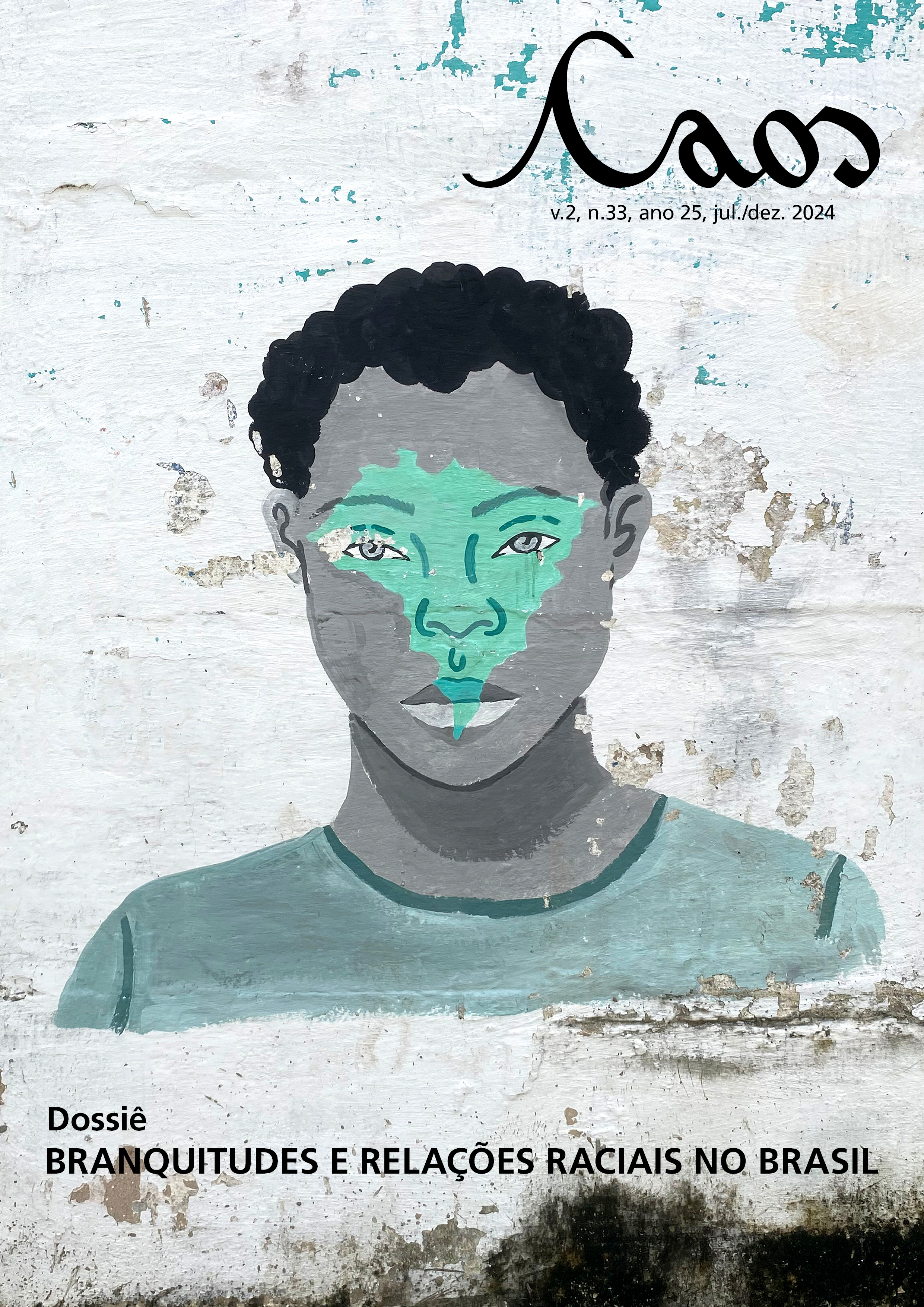UNDER THE SKIN: the pact of whiteness and censorship as a strategy of silencing and power maintenance
DOI:
https://doi.org/10.46906/caos.n33.70667.p70-89Keywords:
narcissistic pact of whiteness, literary censorship, anti-racist education, Jeferson Tenório.Abstract
This study aims to examine contemporary manifestations of the narcissistic pact of whiteness in Brazil, with an emphasis on the censorship of the book O avesso da pele by Jeferson Tenório (2020), which occurred in schools in some Brazilian states in 2024. The methodology is based on two axes: the concept of the narcissistic pact of whiteness, defined by Cida Bento (2022) and the analysis of the episode of censorship of Tenório's work. Additionally, analyses of excerpts from the book were carried out, relating them to issues of structuring and perpetuation of racism in Brazil. The theoretical foundation includes contributions from Jessé Souza (2017), Silvio Almeida (2019), Kabengele Munanga (2005) and Lélia Gonzalez (2020), providing a basis for understanding the complexities of racism in the Brazilian context. Discussions on the role of literature in anti-racist education were supported by Bárbara Carine Pinheiro (2020), Chimamanda Ngozi Adichie (2019) and Conceição Evaristo (2009), who highlighted the importance of diverse and representative narratives in the formation of a critical and inclusive consciousness. This article aims to contribute to the understanding of racial and social dynamics, promoting an inclusive and transformative dialogue in response to the call for the construction of new civilizing pacts, as proposed by Bento (2022).
Downloads
Metrics
References
ADICHIE, Chimamanda Ngozi. O perigo de uma história única. São Paulo: Companhia das Letras, 2019.
ALMEIDA, Silvio. Racismo estrutural. São Paulo: Pólen, 2019.
AKOTIRENE, Carla. Interseccionalidade. São Paulo: Pólen, 2019.
ALVES, Maria H. Moreira. Estado e oposição no Brasil (1964-1984). Petrópolis: Vozes, 1985.
BORGES, Arleth Santos; BARRETO, Renata Caldas. Ditadura, controle e repressão: revisitando teses sobre os governos militares do Brasil. Revice - Revista de Ciências do Estado, Belo Horizonte, v. 1, n. 2, p. 107-129, 2016. Disponível em: https://periodicos.ufmg.br/index.php/revice/article/view/e5010. Acesso em: 11 nov. 2024.
BENTO, Maria Aparecida da Silva. O pacto da branquitude. São Paulo: Selo Negro, 2022.
BRASIL. Ministério da Educação. Programa Nacional do Livro Didático. Parecer sobre a obra O avesso da pele. Brasília, DF: MEC, 2021. Disponível em https://drive.google.com/drive/folders/1OzWbVCF7gIkKMxJkP4kqFL_AelFxj4wO. Acesso em: 18 set. 2024.
BRASIL. Comissão Nacional da Verdade. Relatório Final. Brasília: CNV, 2014. v. 1. Disponível em: https://www.gov.br/memoriasreveladas/pt-br/assuntos/comissoes-da-verdade/volume_1_digital.pdf. Acesso em: 11 nov. 2024.
CARNEIRO, Maria Luiza Tucci. Livros proibidos, ideias malditas: o Deops e as minorias silenciadas. 2. ed. São Paulo, Ateliê, 2002.
EVARISTO, Conceição. Escrevivências: a escrita de nós: reflexões sobre a obra de Conceição Evaristo. Rio de Janeiro: Mina Comunicação e Arte, 2020. E-book. Disponível em: https://www.itausocial.org.br/wp-content/uploads/2021/04/Escrevivencia-A-Escrita-de-Nos-Conceicao-Evaristo.pdf. Acesso em: 08 jul. 2024.
EVARISTO, Conceição. Literatura negra: uma poética de nossa afro-brasilidade. SCRIPTA, Belo Horizonte, v. 13, n. 25, p. 17-31, 2009. Disponível em: https://periodicos.pucminas.br/index.php/scripta/article/view/4365. Acesso em: 11 nov. 2024.
GOMES, Nilma Lino. Relações étnico-raciais, educação e descolonização dos currículos. Currículo sem Fronteiras, Portugal, v. 12, n. 1, p. 98-109, jan./abr. 2012. Disponível em: http://www.curriculosemfronteiras.org/vol12iss1articles/gomes.pdf. Acesso em: 11 nov. 2024.
GOMES, Nilma Lino. Diversidade étnico-racial, inclusão e equidade na educação brasileira: desafios, políticas e práticas. RBPAE, Brasília, v. 27, n. 1, p. 109-121, jan./abr. 2011. Disponível em: https://seer.ufrgs.br/index.php/rbpae/article/view/19971. Acesso em: 11 nov. 2024.
GONÇALVES E SILVA, Petronilha Beatriz. Aprender, ensinar e relações étnico-raciais no Brasil. Revista Educação, Porto Alegre, v. 3, n. 63, p. 489-506, set./dez. 2007. Disponível em: https://revistaseletronicas.pucrs.br/faced/article/view/2745. Acesso em: 11 nov. 2024.
GONZALEZ, Lélia. Por um feminismo afro-latino-americano: ensaios, intervenções e diálogos. Rio de Janeiro: Zahar, 2020.
MUNANGA, Kabengele (org.) Superando o racismo na escola. 2. ed. Brasília: Ministério da Educação, 2005.
PINHEIRO, Bárbara Carine Soares. Como ser um educador antirrascista. São Paulo: Planeta do Brasil, 2023.
PINHO, Osmundo. Um enigma masculino: interrogando a masculinidade da desigualdade racial no Brasil. Universitas Humanística, Bogotá, v. 77, n. 77, p. 227-250, 2014. Disponível em: https://revistas.javeriana.edu.co/index.php/univhumanistica/article/view/5945. Acesso em 12 jun. 2024.
RADIO SENADO. Jeferson Tenório fala de "O avesso da pele", de racismo e de censura de livros. Entrevistado: Jeferson Tenório. Entrevistador: Anderson Mendanha. [S.l.]: Radio Senado, 05 abr. 2024. Disponível em: https://www12.senado.leg.br/radio/1/autores-e-livros/2024/04/05/autores-e-livros-314-6-e-7-04-2024. Acesso em: 11 nov. 2024.
REIS, Daniel Aarão; RIDENTI, Marcelo; MOTTA, Rodrigo Patto Sá. O golpe e a ditadura militar: 40 anos depois (1964-2004). Bauru: Edusc, 2004.
SANTOS, Emily. “O Avesso da pele”: livro que debate racismo é censurado em escolas de 3 estados por reação equivocada ao conteúdo, alertam especialistas. Portal G1 Educação, postado em 03 de março de 2024. Disponível em: https://g1.globo.com/educacao/noticia/2024/03/08/o-avesso-da-pele-livro-que-debate-racismo-e-censurado-em-escolas-de-3-estados-por-reacao-equivocada-ao-conteudo-alertam-especialistas.ghtml. Acesso em: 11 nov. 2024.
SOUZA, Jessé. A elite do atraso: da escravidão à Lava Jato. Rio de Janeiro: Leya, 2017.
TENÓRIO, Jeferson. O avesso da pele. São Paulo: Companhia das Letras, 2020.
VISTA, Isa Morena. Livro “O avesso da pele” retorna a escolas do Paraná e de Goiás após censura. O Globo, Rio de Janeiro, 9 de abril de 2024. Disponível em https://oglobo.globo.com/brasil/noticia/2024/04/09/livro-o-avesso-da-pele-retorna-a-escolas-do-parana-e-de-goias-apos-censura. Acesso em: 10 maio 2024.
Published
Issue
Section
License
Copyright (c) 2024 Eliane da Silva, Júlia Batista Alves

This work is licensed under a Creative Commons Attribution-NonCommercial 4.0 International License.
A Caos é regida por uma Licença da Creative Commons (CC): CC BY-NC 4.0, aplicada a revistas eletrônicas, com a qual os autores declaram concordar ao fazer a submissão. Os autores retêm os direitos autorais e os de publicação completos.
Segundo essa licença, os autores são os detentores dos direitos autorais (copyright) de seus textos, e concedem direitos de uso para outros, podendo qualquer usuário copiar e redistribuir o material em qualquer suporte ou formato, remixar, transformar e criar a partir do material, ou usá-lo de qualquer outro propósito lícito, observando os seguintes termos: (a) atribuição – o usuário deve atribuir o devido crédito, fornecer um link para a licença, e indicar se foram feitas alterações. Os usos podem ocorrer de qualquer forma razoável, mas não de uma forma que sugira haver o apoio ou aprovação do licenciante; (b) NãoComercial – o material não pode ser usado para fins comerciais; (c) sem restrições adicionais – os usuários não podem aplicar termos jurídicos ou medidas de caráter tecnológico que restrinjam legalmente outros de fazerem algo que a licença permita.
Recomendamos aos autores que, antes de submeterem os manuscritos, acessem os termos completos da licença (clique aqui).
















